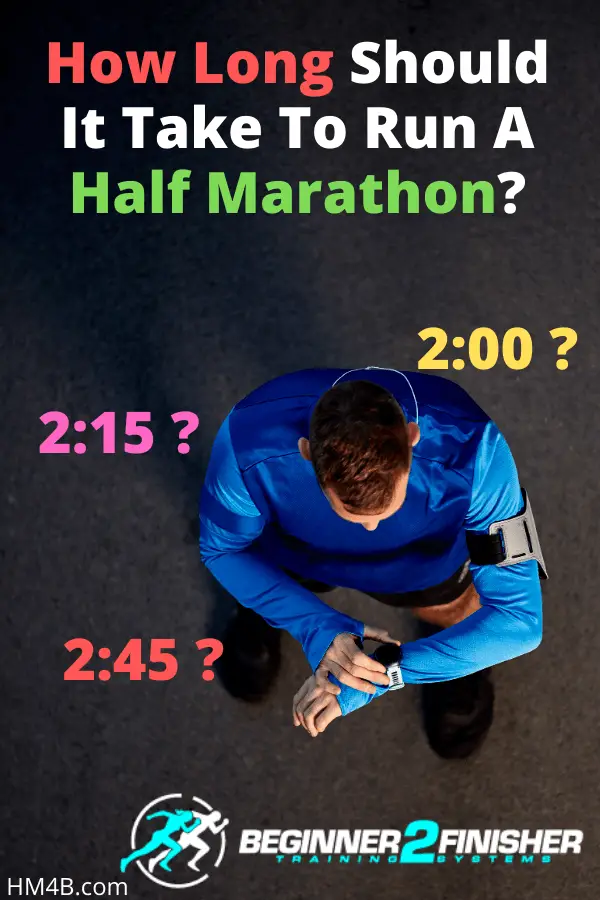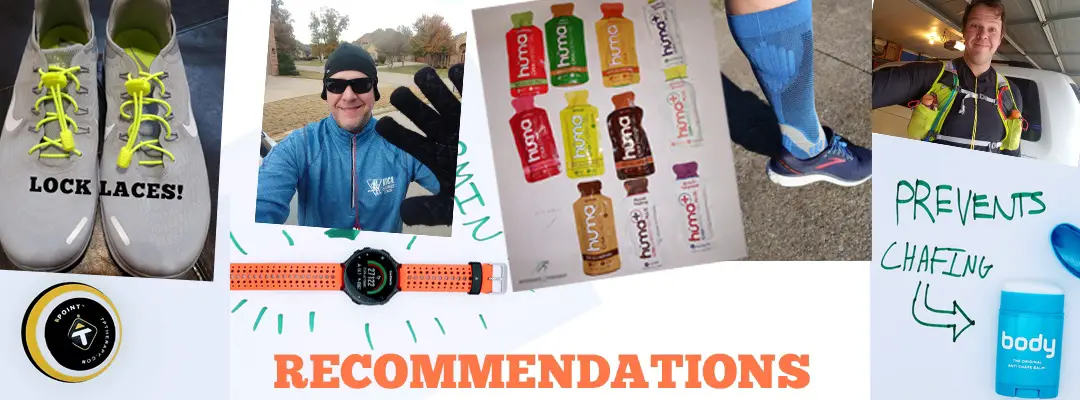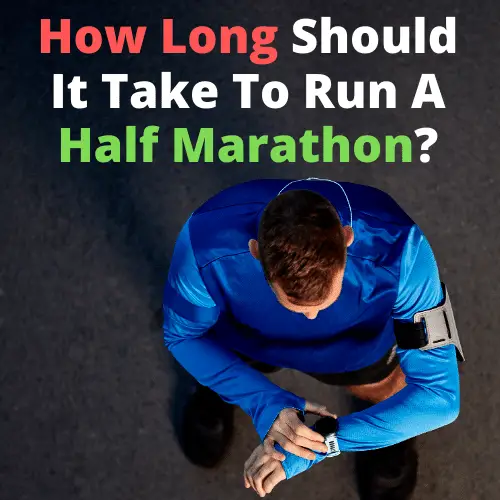You’ve taken the next steps beyond the 5K or 10k race and you’re wanting to run your first half marathon. Taking a leap from 5K or 10K to a half marathon can be daunting. Several questions arise like where should I race my first half marathon to how long do I need to train in order to complete a half marathon. One specific question that most new half marathons what to know the answer to is:
How long should it take to run a half marathon?
A good guideline to follow is to determine your average 5K race finish time. Once you determine your average 5K race pace, you then look up the corresponding 5K race pace with a calculated predicted half marathon finish time and half marathon race pace. This should be an average of your last 3 5Ks within a 3-month window. If your last 5K was more than 6 months ago and you haven’t been running lately, you’re better off running a 5K distance and using this current determinant to identify your predicted half marathon finish time.
Assumptions
To accurately determine a predicted half marathon pace we are going to assume this simple rule:
Your pace for 1 mile is going to be better than your average pace of a 5K race. The 5K average pace is going to be faster than your 10K average pace. Your half marathon race pace will be slower than your pace for 1 mile, a 5K, or a 10K. If you’ve run a race in a poor physical state, such as being injured, don’t use this pace as a starting point.
How to figure out your predicted half marathon finish time?
To determine what your current predicted half marathon finish time is, you’ll need to assess your current physical fitness level. The best way to assess your current fitness is by using your past race times as benchmarks to predict your half marathon finish time. I’m going to assume that if you’re reading this post you haven’t run a half marathon race before. More than likely, you’ve probably at least run a 5K or maybe a 10K race. Let’s look at several different ways to determine a pace that can indicate a fairly predictable half marathon race pace:
The most accurate method to determine your half marathon pace
Listed in order, the top being the most accurate and the bottom being the least accurate way to determine your half marathon pace:
- 10K average pace
- 5K average pace
- 1-mile pace
Predicting your half marathon pace based on a 10K race
This is probably the best indicator for predicting your half marathon pace and finish time. Running the distance of a 10K, however, isn’t required prior to running the distance of a half marathon. If you’ve run a 10K before it will only aid you in preparing for your first half marathon. Based on your current 10K race time calculate your finish time by 2.227 to determine your predicted half marathon finish time. After determining your finish time, divide the finish time by 13.1 miles to determine your half marathon predicted pace.
10K Example 1:
10K finish time: 60 minutes (1 hour)
Predicted half marathon finish time: 2.227 * 60 minutes = 2 hours 14 minutes
Miles: Predicted half marathon pace: 2 hours 14 minutes = 120 minutes + 14 minutes = 134 minutes / 13.1 miles = 10:13 minutes/mile
Kilometers: Predicted half marathon pace: 2 hours 14 minutes = 120 minutes + 14 minutes = 134 minutes / 21.1 kilometers = 6:21 minutes/kilometer
10K Example 2:
10K finish time: 75 minutes (1 hour 15 minutes)
Predicted half marathon finish time: 2.227 * 75 minutes = 2 hours 47 minutes
Miles: Predicted half marathon pace: 2 hours 47 minutes = 120 minutes + 47 minutes = 167 minutes / 13.1 miles = 12:46 minutes/mile
Kilometers: Predicted half marathon pace: 2 hours 14 minutes = 120 minutes + 14 minutes = 167 minutes / 21.1 kilometers = 7:55 minutes/kilometer
Predicting your half marathon pace based on a 5K race
Using your 5K average pace to determine your half marathon pace is the most commonly used method. Most runners, before attempting to conquer a half marathon, have more than likely run at least one 5K race. If you haven’t run a 5K race or at least ran approximately 3 miles then you need to skip down to determining your half marathon pace based on running one mile.
Half Marathon Pace Predictor based on 5K finish time
HM FT = Half Marathon Finish Time
Predicting your half marathon pace based on running 1 mile
This will be the least accurate way to determine your half marathon predicted pace. There are several different thoughts on determining how to run your 1 mile so that you can determine your predicted half marathon pace. Some experts say to run your fastest mile, others run a medium-paced mile, and still, others say run an easy mile at a conversational pace to determine your predicted pace. In my opinion, I don’t think running your fastest mile is the best way to figure out your predicted pace. Two reasons why running a mile at a conversational pace makes more sense. First, you’re not pushing yourself to the brink of exhaustion by running your fastest mile. Secondly, since you won’t be running anywhere near this pace it doesn’t make sense to use this as the benchmark.
New Runners
For new runners, between 80 and 90 percent of the total volume of your weekly runs will be easy conversational running. In fact, you don’t need to perform any speed work to finish near your half marathon predicted pace. Read a post I wrote about whether or not you need to include speedwork for your first half marathon. I didn’t include any speedwork during my training for my first half marathon. Guess what? I beat my predicted half marathon finish time by almost 20 minutes. Not one single shred of speedwork. While you can argue that I might not have been running at my full potential, I was just glad to beat my predicted half marathon pace by a significant amount of time.
Since most of your runs will be at an easy pace, use this formula to determine your finish time and pace:
Run 1 mile while being able to sing out loud or hold a conversational pace. Multiply your pace for 1 mile by 14. This will give you a half marathon predicted pace in minutes then divide by 60 minutes to get your finish time.
1-mile example:
1-mile pace: 9 minutes 30 seconds (5 minutes 54 seconds per kilometer)
Predicted half marathon finish time: 14 * 9.5 minutes = 2 hours 13 minutes
Miles: Predicted half marathon pace: 2 hours 13 minutes = 120 minutes + 13 minutes = 133 minutes / 13.1 miles = 10:09 minutes/mile
Kilometers: Predicted half marathon pace: 2 hours 13 minutes = 120 minutes + 13 minutes = 133 minutes / 21.1 kilometers = 6:15 minutes/kilometer
Predicting your half marathon pace based on walking 1 mile
I’m going to throw up a huge caution flag. While technically you can walk a half marathon if given enough time, you might want to switch posts and read this in-depth post about walking a half marathon in 4 hours (can you walk a half marathon in 4 hours?). Most half marathon races stay open for 4 hours, however, some do have shorter cutoff times. For more information about cutoff times, read this extensive post about, how long do half and full marathons stay open for runners.
Safety guidelines for predicting your half marathon finish time
Remember that half marathon predicted paces are based on assumptions and calculations pertaining to your current fitness level. Don’t attempt to cheat the system and push yourself to unrealistic goals and expectations for your half marathon race. Doing so could lead to injury and unwanted outcomes.
If you’re using your 5K finish time data from 3 years ago, these aren’t going to be good benchmarks to use to assess your current physical fitness level. Again, your easiest way to determine your half marathon predicted finish time is to go run a 5K or 3.1 miles and then use the table above.

Your best bet
The further you get away from the race distance, the more unreliable the pace predictions and finish times will be. With each mile that you run, the further and further your distance becomes, which in turn slows down your running. You simply can’t run a first half marathon at your 5K race pace. Knowing this you should try to at least use the 5K finish time at a minimum as a good half marathon pace predictor.
Remember that these are mere predictions and nothing more. Simple target goals to aim for so that you can cross the half marathon finish line at your best pace. Your actual finish time could be much less or much greater than the predictions listed within this post. I recommend that all new half marathoners focus on finishing the race at a comfortable pace. After you’ve completed your first half marathon, go ahead and start throwing in tempo runs, intervals, and strides to increase your speed.
Are You Considering A Full Marathon Race?
If you’ve recently completed your first half marathon and you’re considering a full marathon race, it’s going to take you roughly another 8 weeks to be able to run the full marathon, at a minimum. I ran my first half marathon race and then immediately started training for my first marathon race which was 12 weeks later.
One way to line up your first half marathon race while training for a marathon race is to treat your first half marathon race as simply one of your upper long runs of 13.1 miles. Run at an easy pace and simply complete the half marathon race. You will have completed two tasks with one run: 1) finished a half marathon race and 2) completed a long run in your marathon training schedule.
For a full post on transitioning from a half marathon to a marathon race check out: From Half To Full: 10 Ways To Transition To A Full Marathon.
| Help support me and subscribe to my YouTube channel. YouTube video - 30 ways to make your runs less painful! Coach Scott's Credentials:
|
To sign up for a FREE half marathon training schedule, log sheet, and pace predictor CLICK HERE.

Recommended gear for runners
Connect with me:
| facebook.com/BeginnerToFinisher/ |

Use a pedometer to calculate the gap that you walk in different circumstances.
Good post however I was wanting to know if you could write
a litte more on this subject? I’d be very thankful if you could elaborate a little bit further.
Thanks!